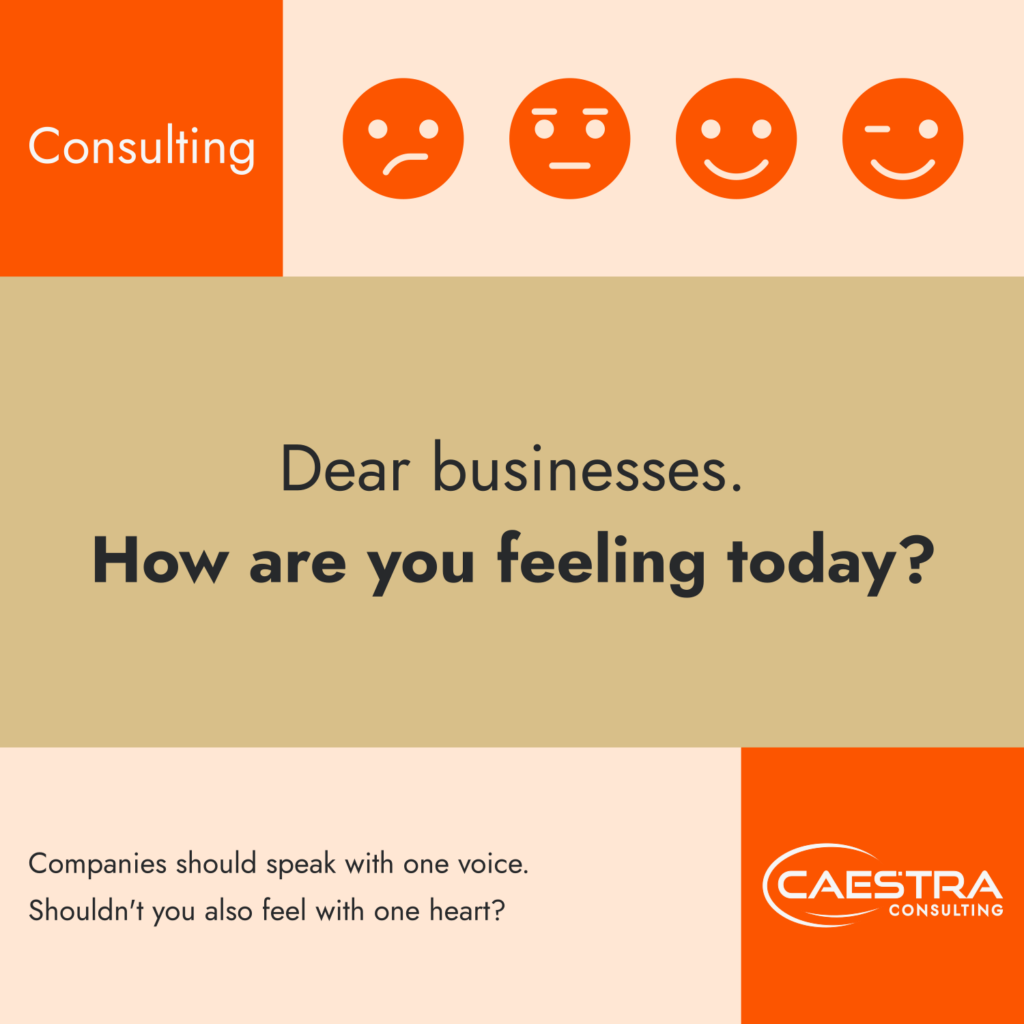Put people at the center, let technology be your partner.
Corporate Emotional Intelligence – Companies are increasingly perceived as social factors rather than legal entities. In the best case, companies speak with one voice. Shouldn’t you then also feel with one heart?

While it’s undisputed that individual humans are capable of emotions, what about organizational emotion? Have you ever considered how you want to control and regulate the emotions of your company? Can a company love, hate, feel disappointed, or be grateful? And what’s the point of this question anyway?
Purchase decisions, employee motivation, investor support, or supplier loyalty are emotion-driven attributes of your stakeholders. Corporate Social Responsibility (CSR) is now effectively legally mandated corporate empathy.
At the very least, when a company is faced with frustrated customers, demotivated employees, or investors expressing their displeasure, it should be able to react to human emotions – recognizing, understanding, leveraging, and regulating them.
So, the question is legitimate. Can a company have not only a corporate culture but also Corporate Emotional Intelligence (EI)?
A company is a legal entity and not a human being, as sensitive as the next brick wall. As a compensation, you give it a strong corporate culture to create an “institutionalized” identity that should strengthen stakeholder relationships and guide employee behavior. However, true Corporate Emotional Intelligence doesn’t emerge from this “character formation”.
It’s the natural persons within a company, you and your staff, who bring emotions into the company. So far, so mundane.
In reality, though, this leads to complications.
Let’s take the example of a frustrated customer. Who identifies the frustration? A salesperson in the store, a hotline employee, the social media department? Is it always the same person or different individuals who, in doubt, understand the customer’s frustration according to their own empathic abilities – from emergency to triviality?
The emotional intelligence of a company correlates with the emotional intelligence of its employees. It appears neither homogeneous nor reliably predictable.
Yet, companies face the same emotional demands we would place on an individual if we wanted to show appreciation for them. When private customers or companies are asked about the most important emotional component of a business relationship, the word “trust” is most commonly heard. Trust is built – alongside other factors – on two significant factors
1. Consistency – Trust is built when a person acts consistently and reliably. Consistent behaviors create predictability and security.
2. Empathy – The ability to empathize with the feelings and needs of others is crucial for building trust because it shows that a person respects and understands the perspectives and experiences of others.
Let’s go one step further. Supply Chain Act, CSRD – legislation requires companies to assess the impact of their activities on their environment, and requirements increase almost annually. Now, alongside the reactive demands in dealing with emotions, comes active action based on empathy.
So emotional consistency and empathy go hand in hand when it comes to fundamental interactions at the base of your company. Just as companies ideally speak with one voice, you should also feel with one heart in decisive situations.
A lot to ask for a emotionless legal person!
No problem, you think. After all, empathetic corporate leadership, social responsibility, or the psychological well-being of employees have been bandied about in every village over the past two decades. We train our executives, we hire empathetic employees, we promote a feedback culture, formulate our values, and showcase them on every occasion.
So far, so good. Admittedly, the measures mentioned help every company to bring Emotional Intelligence into the organization, but how consistently have the individual measures actually been integrated into your organization and processes? How well do they solve the problems mentioned above? Individuals within the organization with their individual characteristics are still at work. Emotional intelligence continues to show itself at best in the individual, but not on an organizational level.
We apologize at this point for the subsequent perversion of the term emotion.
Bringing emotional intelligence to an organizational level means institutionalizing Emotional Intelligence – the consistent planning, implementation, control, and regulation of emotions in your corporate organizations and business processes.
Hand on heart (your own) – how comprehensively are “soft” factors integrated into business plans or target agreements? What key figures regarding EI have you developed and consistently applied recently? What exactly results from the much-praised feedback culture in your company? How do you assess the future impact of your work on your environment? Is there a specialist department for this? What qualifies the employees of this specialist department? Do the emotions of product developers, machine operators, warehouse staff influence the development of your products and organization? What about influencing and empowerment?
A large number of companies will admit upon closer inspection that they have not yet considered or only superficially integrated Corporate Emotional Intelligence into their organizations and processes.
However, alternative tools and work models are available to us today that could facilitate or even promote the systematic integration of EI.
But they still remain marginal phenomena in a classic corporate image that continues to rely on proven organizational forms, technical features, and mathematical metrics.
Corporate Emotional Intelligence is not a figment of the imagination or a topic for isolated think tanks. Companies are increasingly perceived as social factors rather than legal entities. Accordingly, corporate development should meet the changing requirements.
There is still much to be done!
If this topic interests you
and you are asking yourself how you can make your own company “more emotional”, then contact us. We are grateful for any exchange with you, regardless of whether you want to book one of our services on the topic of Corporate EI or not. We are just a click away!
Wir sprechen Deutsch / Nous parlons Français / Wij spreken Nederlands